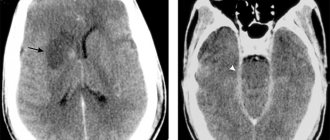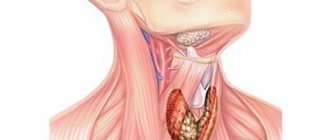Thyroid functions
The endocrine system includes endocrine glands that continuously produce hormones. With the help of blood they are carried throughout the human body. Each hormone performs a specific function, thereby regulating the functioning of organs and ensuring their interconnection.
The endocrine glands are connected to each other and the central nervous system in such a way that each hormone is synthesized at a certain time of day and in the required volumes. Thanks to such a well-functioning system, the body functions in accordance with all changes in the external and internal environment.
If at least one gland begins to synthesize insufficient or excessive amounts of hormones, a malfunction occurs. The thyroid gland produces several hormones, the main ones being: T3 (triiodothyronine) and T4 (thyroxine). One of the conditions for the full functioning of the gland is the intake of at least 150 mcg of iodine per day into the body.
general information
Increased activity of the thyroid gland negatively affects organs and systems: the load on the heart, kidneys, digestive organs, blood vessels, and nerve fibers increases. The longer the high concentration of thyroid and thyroid-stimulating hormones persists, the more severe the intoxication.
If signs of thyrotoxicosis appear, it is important to consult an endocrinologist. It is necessary to carry out adequate therapy so that dangerous complications do not develop in the body. In the absence of treatment, negative processes in the elements of the cardiovascular system intensify. During a thyrotoxic crisis, damage to many organs is possible. Hyperthyroidism code according to ICD – 10 – E00 – E007.
What is hyperthyroidism?
It belongs to the category of endocrine syndromes, the development of which is caused by hyperfunction of the thyroid gland. The cells of this organ begin to produce thyroid hormones (thyroxine, triiodothyronine) in excess quantities, which affects metabolic processes in the body and accelerates their course many times over.
Hyperthyroidism is not a disease as most people think. This is a whole symptom complex that characterizes a malfunction of the gland. Usually this pathology is a sign of concomitant diseases (cancer, thyroiditis, diffuse toxic goiter).
Causes
It is not always possible to accurately identify the causes of hyperthyroidism, but among the main causes are:
- stressful influences. As a result, the adaptive function in the body is disrupted. Serious psycho-emotional influences on the body may include: chronic somatic pathologies from all systems (usually the cardiovascular system and urinary system);
- frequent time zone changes;
- the presence of intense work activity with frequent night work;
- lack of sleep.
Risk groups for hyperthyroidism include:
- people with a hereditary predisposition;
- female persons;
- the presence of dysfunctional immune disorders;
- pathological conditions in connective tissues, among which we can highlight the presence of rheumatoid arthritis, rheumatism, lupus erythematosus.
Hyperthyroidism in children is most often associated with a hereditary or autoimmune factor. Therefore, if hyperthyroidism is detected in childhood, efforts should be directed toward identifying other pathologies.
Causes of hyperthyroidism
A third of our planet's population suffers from thyroid dysfunction. Most pathologies are due to hyperthyroidism. In women, symptoms and signs of pathology are immediately reflected in their appearance. Since the thyroid gland is the main producer of hormones, it has a direct impact on all processes in the body. Increased production of thyroxine and triiodothyronine affects the patient’s weight, performance and mood. However, many people prefer not to seek qualified help from a doctor, attributing the primary symptoms of the disease to heredity or simple fatigue.
What can cause hyperthyroidism? Among its main causes are various thyroid disorders. These include: diffuse toxic goiter, Plummer's disease.
Uncontrolled use of hormonal drugs leads to the development of artificial hyperthyroidism. The disease can also be caused by excessive consumption of iodine in food. This element has a direct effect on the synthesis of thyroid hormones.
The most rare causes of hyperthyroidism include the following:
- ovarian tumors;
- side effects of medications;
- pituitary tumors.
Pathology can be preceded by stress and anxiety, various diseases (rheumatism, tuberculosis), pregnancy. In rare cases, the functioning of the gland is disrupted due to an illness of infectious etiology.
Treatment of hyperthyroidism
In women, treatment of hyperthyroidism involves first of all reducing the performance of the thyroid gland to the required level. In this case, pharmaceutical agents are used that tend to block the production of thyroid hormones. In some cases, surgery is also performed, during which surgeons remove one of the parts of this organ.
The dosage and course of taking medications is prescribed individually.
- Beta-blocker drugs - Betaxolol, Anaprilin, Bisoprolol, Nibivolol, Atenolol, Talinolol, Metoprolol, Egilok, Egis, Corvitol, etc. The drugs themselves have no effect on the development of hyperthyroidism, their purpose is due to the effect of weakening symptoms - they reduce signs of tachycardia and pain in the heart, gently normalize blood pressure and arrhythmic conditions.
- With a slight increase in the thyroid gland, drugs that suppress hormonal synthesis are prescribed - “Tyrozol”, “Tiamazol”, “Metizol”, “Mercazolil”, “Carbimazol” or “Propylthiouracil”. It is an overdose of these drugs that can lead to the opposite effect.
- It is absolutely necessary to take sedatives - Valoserdin, Persen or Novo-Passit. This will help normalize sleep, alleviate nervousness and prevent psychological breakdowns.
- The drug "Endonorm" is prescribed to maintain the functions of the gland in the initial period of the disease.
- In case of exhaustion, accompanied by intoxication symptoms and diarrhea, anabolic drugs - Methandriol or Methandienone - may be recommended.
- In case of autoimmune genesis (with ophthalmopathy and adrenal insufficiency syndrome) of hyperthyroidism, glucocorticoid drugs are prescribed - Prednisolone or Dexamethasone.
When treating hyperthyroidism in women, the factor of a nervous system that is more labile than in men is taken into account. Additionally, hypnotics, axiolytics, which reduce emotionality, and tranquilizers are prescribed.
How does hyperthyroidism affect a woman's body?
Symptoms of thyroid hyperthyroidism in women indicate dysfunction of the central nervous system and metabolic disorder. Overly emotional patients may experience increased tearfulness, poor sleep, and mood swings. Other signs of this pathology in women include deterioration in appearance: hair loss and brittleness, splitting of nails. However, the most characteristic symptom is an increase in the size of the gland. Even a slight swelling should be a reason to visit a doctor. Let's consider how pathology manifests itself in various organ systems.
- Central nervous system disorder. Insomnia, increased irritability, panic attacks, poor coordination of the thought process - all this allows one to suspect hyperthyroidism.
- Symptoms in women from the cardiac system are manifested by persistent sinus tachycardia, rapid pulse, and increased blood pressure.
- Vision pathology is characterized by limited mobility of the eyeball and its simultaneous displacement forward. Patients complain of double vision and constant tearing.
- Disturbances in metabolic processes. There is a sharp decrease in body weight against the background of excellent appetite. Women also show signs of excessive sweating.
- Muscle weakness. Patients look exhausted and walking becomes difficult. Discomfort and weakness in the muscles make it difficult to perform basic movements.
- Reproductive system and hyperthyroidism. In women, symptoms of pathology often begin to appear with menstrual irregularities. They cannot become pregnant for a long time, and every successful conception usually ends in spontaneous abortion. Menstruation is scanty, accompanied by bloating and severe pain.
How else does hyperthyroidism manifest itself? Symptoms in menopausal women are practically no different from the clinical picture in young girls. Hot flashes, heat intolerance, tachycardia, rapid heartbeat - all these signs usually accompany the disease.
Hyperthyroidism can lead to secondary diabetes mellitus. The patient gradually develops characteristic signs of hyperglycemia: thirst, dry mouth, excessive urination. Treatment of this pathology is carried out with the help of a strict diet and medications. Insulin administration is usually not required.
CLASSIFICATION
Based on the causes and level of disruption of hormone production, in women, hyperthyroidism of the thyroid gland can manifest itself in the following forms.
Forms of the syndrome:
- The primary form is associated with pathologies in the functioning of the thyroid gland and has the following stages: subclinical - characterized by a mild course without pronounced symptoms; the content of T3 and T4 is within normal limits, the level of thyroid-stimulating hormone (TSH) is slightly reduced;
- manifest (explicit) – marked by a course of moderate severity; the content of T3 and T4 is increased, and TSH is significantly lower than normal;
- complicated (thyrotoxicosis) – marked by a severe course with a pronounced clinical picture.
Hyperthyroidism and pregnancy
Doctors warn that pregnancy in combination with hyperthyroidism can be dangerous. Women with this diagnosis usually develop severe toxicosis, and with it the likelihood of spontaneous abortion and the occurrence of congenital defects in the baby increases. That is why, even at the planning stage, every representative of the fair sex must undergo a comprehensive examination, paying special attention to the condition of the thyroid gland. If the pathology progresses during pregnancy, doctors’ ability to eliminate it is very limited. Most of the treatment regimens used involve the use of drugs that are dangerous to the fetus.
GENERAL
According to the World Health Organization, the ratio of identified cases of the syndrome in women and men is five cases to one, respectively. On the territory of the Russian Federation, this ratio is approximately eight cases to one.
Facts about the syndrome:
- The production of excessive amounts of thyroid hormones by the thyroid gland leads to the destruction of cortisol and the development of kidney failure.
- Women with hyperthyroidism experience regression of reproductive function up to infertility.
- Women aged 20 to 50 years are at risk.
- There are approximately 20 cases of hyperthyroidism detected per 1000 female representatives.
- The use of new treatments has reduced the number of deaths from 50% to almost 0%.
Medical examination
When hyperthyroidism is suspected, symptoms in women play an important role in making a diagnosis. At the initial stages, the pathology occurs without obvious signs, so patients are in no hurry to see a doctor.
The final verdict is determined by the doctor based on the patient’s complaints and examination results. When making a diagnosis, the content of thyroid hormones in the blood is assessed. Ultrasound is used to determine the size of the thyroid gland. The localization of nodular formations can be determined using computed tomography. If necessary, an additional biopsy of the gland is prescribed for the purpose of cytological examination.
Diagnostics
In hyperthyroidism, a history is important. That is, the diagnosis will be aimed at collecting the necessary information. These are the possible causes of the disease, symptoms and manifestations.
In case of hereditary pathology, anamnesis is studied. That is, if there were relatives in the family with an aggravating clinical sign, then hyperthyroidism is possible.
Patient complaints are also taken into account. Especially if there are specific symptoms.
Conduct a blood test for hormones. If certain hormones are detected in the blood, namely their increased formation, then a diagnosis can be made.
Ultrasound diagnostics is also very important. Namely, the thyroid gland. This allows you to determine the presence of a seal and its size.
An additional technique is ECG. Since pathological changes in the cardiovascular system are possible.
The most informative method is a biopsy of a thyroid nodule. This will allow you to make the most accurate diagnosis.
go to top
Treatment methods
If hyperthyroidism is suspected, symptoms and treatment in women should be determined as quickly as possible. Lack of adequate therapy can lead to life-threatening complications.
In total, there are three treatment options: conservative, surgical, radioiodine therapy. In each specific case, either one of them or a combination can be used. The choice of the final option depends on the doctor. The specialist must take into account several factors simultaneously. First of all, this is the patient’s age, the presence of other diseases, and the individual characteristics of the body.
When choosing a conservative treatment option, the patient is prescribed thyreostatic drugs (Metamizole, Propylthiouracil). Medicines prevent the accumulation of iodine in the body and reduce the production of thyroid hormones.
Surgical treatment involves excision of part of the gland, which is characterized by increased secretion. If the entire organ must be removed, the patient is prescribed hormone replacement therapy for the rest of his life.
Very often, radioiodine therapy is combined with a conservative therapy option. The patient is prescribed a one-time dose of a capsule with radioactive iodine. The drug is contraindicated in pregnant and lactating women. As a result of this treatment, the iron decreases in size and the secretion of hormones decreases.
Conservative and surgical methods of therapy can cure hyperthyroidism. Symptoms in women become less pronounced if they use the radioiodine method of combating the disease.
Treatment
Three methods play a major role in the treatment of hyperthyroidism. These include:
- drug treatment;
- surgical treatment;
- radioiodine therapy.
Not everyone is probably familiar with the latter technique. But in developed countries it is already used.
However, before choosing the appropriate technique, it is important to consult with an endocrinologist. It all depends on the age and course of the disease.
Conservative or medicinal treatment includes:
- antithyroid drugs;
- drugs that suppress the secretory function of the thyroid gland.
These drugs can be combined with each other. Since they have a similar function and are aimed at reducing the increased production of hormones.
Surgery involves removing part of the thyroid gland. However, this technique is used according to indications.
But the essence of surgery is not so effective. Hypothyroidism may develop. Which greatly aggravates the picture of the disease.
Additional treatment methods include proper nutrition, hydrotherapy and diet therapy.
Radioiodine therapy includes treatment with radioactive iodine. But it requires an integrated approach. That is, it is combined with drug treatment.
However, this technique is ineffective. Radioactive iodine treatment is often re-prescribed. Because hyperthyroidism occurs again.
go to top
Prevention
To prevent hyperthyroidism, doctors recommend following simple rules:
- Regularly undergo ultrasound examination of the thyroid gland and take blood tests to determine hormone levels.
- Eat properly. The diet should be balanced. Preference should be given to products that are rich in iodine.
- Refuse to visit the solarium, and exposure to the sun should be dosed.
Now you know what hyperthyroidism is. Symptoms and treatment of this pathology in women are two interrelated issues that require qualified medical assistance. If you take the necessary measures to eliminate this problem in a timely manner, you can avoid the development of dangerous complications.
Symptoms of hyperthyroidism
Photos of the main symptoms of hyperthyroidism
Thyroid pathology has many clinical manifestations. This is due to the influence of this endocrine organ on all body systems. The symptoms of hyperthyroidism will not always have external manifestations, since many only change the functioning of internal organs, which are not detected for a long time. Symptoms of hyperthyroidism in women and men are generally the same.
From an external examination, you can see the following signs of hyperthyroidism:
- the skin acquires increased sweating, it is constantly wet, not corresponding to weather conditions or temperature conditions, it becomes thin;
- hair becomes thinner and prone to diffuse hair loss. Pronounced changes appear on the nails, which are characterized by the development of painful peeling lamellar formations;
- the palpebral fissure increases significantly, as do the eyeballs (see photo above). This condition is called exophthalmos. Externally, the eyes will be bulging;
- the skin of the eyelids will be swollen and characterized by severe hyperpigmentation;
- An enlarged formation appears in the neck area, which interferes with a person’s daily life. The patient may complain of difficulty breathing, difficulty swallowing, and the inability to wear clothes that fit close to the neck. Hyperthyroidism in this case is associated with an increase in gland tissue or a node in its stroma. Such symptoms are less common in men, largely due to the anatomy of the neck.
The disease also affects the cardiovascular system. Gradually progressing hyperthyroidism (thyrotoxicosis) leads to the development of heart failure, which is irreversible. This condition is life-threatening, since the heart muscle does not perform full work, the required volume of blood is not pumped, gradually leading to its stagnation in the distal sections.
At the initial stage, heart damage in hyperthyroidism manifests itself:
- increased heart rate
- shortness of breath and the development of wheezing in the lungs due to congestion gradually develop.
Against the background of mild or moderate hyperthyroidism, there is an increase in appetite, which, as the pathology progresses, is replaced by its deterioration until the development of anorexia. Loss of body weight is largely due to the development of nausea, vomiting, and diarrhea.
The condition of the musculoskeletal system gradually worsens, leading to osteoporotic conditions. Following a decrease in bone density, there is a decrease in muscle volume, which increases the risk of developing pathological fractures several times. Due to the accumulation of potassium, motor activity is impaired, which is expressed in increased muscle fatigue and tremors of the limbs.
Disruption of the nervous system is manifested by increased excitability, nervousness, and frequent insomnia. A patient with hyperthyroidism is worried about fear and overcomes panic attacks; there is an increase in intellectual abilities and speech activity.
The pathological process also affects the genitourinary system, which is manifested by increased urination.
The reproductive system is affected in both men and women.
Symptoms of hyperthyroidism in women manifest themselves in the form of irregular menstrual bleeding. In addition, there is severe pain, a slight amount of blood loss, nausea and vomiting. During menstruation, a feeling of severe weakness appears. Symptoms in men are manifested by a decrease in potency and growth of breast tissue. In both cases, the disease can lead to infertility. Patients often experience headaches and hyperthermia.
Complications
Complications of hyperthyroidism are currently quite rare phenomena; this is largely due to an advanced pathological process that has not been treated. Among the main manifestations of complications of hyperthyroidism are:
- development of thyrotoxic crisis. This condition can pose a real threat to human life and is associated with a sharp increase in the level of thyroid hormones in the blood. A crisis usually appears acutely. It is noted: the development of cramping pain in the abdominal area;
- disruption of the cardiovascular system, in the form of increased heart rate, arrhythmia and a sharp rise in blood pressure with a possible drop;
- changes in consciousness with severe headaches, dizziness;
- the appearance of nausea, vomiting that does not bring relief and diarrhea;
- development of hyperthermia to high values;
- this condition can result in impaired consciousness up to the development of coma.











